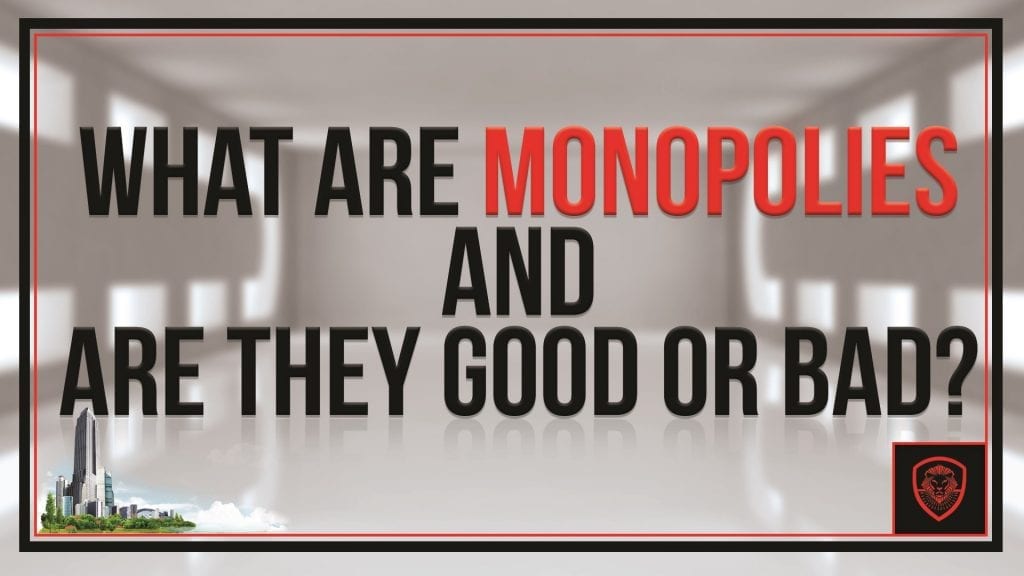
In this post I cover three different conditions that cause a monopoly to exist, and the impact that monopolies have on consumers.
Now when I talk about monopoly, I’m not talking the game we play with our buddy named Uncle Pennybags, where we roll the dice, collect $200 and hope to get out of jail free. I’m talking about real life monopoly.
Here are the three things that cause a monopoly to happen.
[thrive_leads id=’7165′]
#1: Only One Firm Sells the Product
#2: A Difficult Barrier of Entry
In this case, the government has created so many regulations such as licensing that it makes it tougher for smaller businesses to go in and compete with bigger businesses.
If there are too many regulations, and too many laws, it’s very difficult for small businesses to compete.
#3: There’s No Close Substitute
Here’s an example of a close substitute. I have a choice between buying a car, or a motorcycle, or a bicycle. Those are close substitutes.
Here are a few other examples.
When Apple first came out with the iPhone, it was a big hit. People said things like, “Oh, it’s a smartphone! It’s incredible! It does your thinking for you.”
One of the best things that happened for all of us, including iPhone users, was when Droids came out, particularly when Samsung came out with their Galaxy phones with the larger screen. That phone influenced Apple to get a bigger screen, and to get better in other ways as well. If Galaxy phones improve, and the iPhone doesn’t, Apple will lose customers.
Another example is Netflix. Amazon came along and decide to compete with them. The result was that Netflix had to improve their product, and maintain competitive prices.
Groupon was a monopoly when it first came out, but that didn’t last long. Within a year, numerous group-buying websites such as LivingSocial came out. That competition made Groupon change their relationships with the businesses, so they went from splitting profits 50/50 to 60/40 to 70/30 to 80/20 because there were other people that were offering the same thing as them.
The Number One Thing that Prevents a Monopoly
The number one thing that prevents a monopoly from happening is choice. When there are choices, everybody has the pressure to improve. If I don’t want to go to Starbucks, I have Coffee Bean. If I don’t want to Burger King, I have McDonald’s. If I don’t want to go to Subway, I have Quiznos. The list goes on. Because choices prevents monopolies from taking place.
When you think about the pendulum of business, over to the far right, there is only one company. In that case, it’s a pure monopoly. Over to the far left, there is pure competition, with many, many firms. What do you think is the best opportunity for you and me? A lot of firms! That’s why it’s called free trade.
When Japan was allowed to come in and compete with Ford and Chevrolet, Toyota and Honda came along. It allowed international companies to compete domestically. That not only results in products getting cheaper and cheaper, it also compels companies to produce better products. Innovation gets better because they see what their competitors are doing.
The One Organization that Can Prevent and Influence Monopolies
Above all, there’s one organization that can both prevent and influence a monopoly from taking place – the U.S. government. Here’s why. The U.S. government can get involved and say, “No, this is a monopoly, this is not going to be taking place.” And on the opposite side, the U.S. government can also create a lot of regulations. By the way, when you and I vote, we may feel like we’re doing the right thing, but it can really hurt small businesses. For example, if we don’t like large companies like Apple or Wal-Mart, we may vote for more regulations, thinking that will hurt those big companies.
But what happens instead is that the big companies say, “No problem. You’re helping us out.” Do you know why? It’s because the more regulations there are, the less smaller businesses can compete with the top guy. That keeps prices from going lower. It’s important to vote for what makes things better, more efficient, and cost effective for the consumers. So keep in mind that the more the regulations, the less that’s going to happen for us.
I’d love to hear your comments and questions, so be sure to leave them below.





